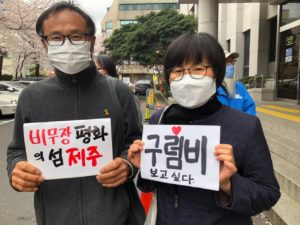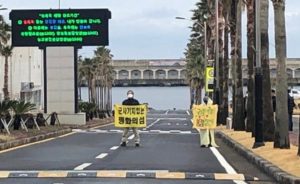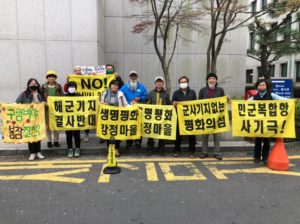
Photo by Choi Sung-hee, of Dr. Song Kang-ho and Ryu Bok-hee before court, holding signs which read “Demilitarized Peace Island Jeju” and “I want to see Gureombi” (which could also be translated as “I Miss Gureombi”)
On March 7, peace activists on Jeju Island cut the fence to enter the naval base that has been opposed by residents of neighboring Gangjeong Village since it was first proposed in 1993, and became the focus of daily protests since 2007, before construction began. Once inside, Dr. Song Kang-ho and Ryu Bok-hee walked to the area of the remaining part of Gureombi Rock to pray for peace.
This petition was submitted to the judge at Jeju District Court on March 30, 2020. The court held proceedings to review the arrest warrants for Gangjeong village peace activists Song Kang Ho and Ryu Bok Hee. In a short time about 4,700 people signed this petition on their behalf. Ryu Bok Hee was released later on the 30th, but Song Kang Ho was held in custody at the Jeju Dongbu Police Station. They are awaiting trial for their visit to the remaining part of Gureombi Rock (inside Jeju Navy Base) on March 7, 2020, the 8th anniversary since the blasting of Gureombi Rock in 2012.
Greetings, your honor.
Together with Song Kang Ho and Ryu Bok Hee, we question the legitimacy of the Jeju Navy Base, established through violence at Gangjeong Village on the Peace Island of Jeju. We are people standing in solidarity and working for peace, as Jeju, the Korean peninsula, and even East Asia and the world are confronted with the problem of military bases.
Already the procedures that brought the Jeju Navy Base to Gangjeong Village have raised much social inquiry. The state has a responsibility to be just and democratic above all, but it used methods that could not be just, then threatened citizens and violently made the military base by force. For that reason, President Moon Jae-in visited Gangjeong Village himself during the Fleet Review in 2018 and apologized to the Gangjeong villagers. According to the 2019 report on the investigations into the Jeju Navy Base incident, government bodies and the military were directly involved in dividing Gangjeong and committing serious human rights violations. A Jeju poet who witnessed the process even said “Gangjeong is 4.3” [referring to the state violence carried out in Jeju in 1948 and following]. We are citizens who have witnessed and experienced this kind of violence for as many as ten or more years. Song Kang Ho and Ryu Bok Hee, they are also people who keep raising questions so that those misfortunes are not repeated. They are people who feel the pain of everything that is mercilessly destroyed.
The particulars are as follows:
1. On February 14, at about 10 AM, Song Kang Ho and Ryu Bok Hee inquired at the navy civil affairs office about how to visit the remaining part of Gureombi rock inside the navy base and submitted their first application. An official called them in response and reported that it was rejected.
2. On March 7, the anniversary of Gureombi’s blasting, at 9 AM, they visited the navy civil affairs office again and submitted another visit application. They were informed that for the reason of safety they could not enter. They expressed their yearning to see Gureombi, and requested cooperation from the military. They gave their contact information and asked for a reply by 10 am. They got no reply, and at 12:00 they submitted another application form, and waited for permission.
3. No response came. Song Kang Ho and Ryu Bok Hee went to Metpuri. Metpuri is the public sea-side area at the far eastern side of Gangjeong which used to be connected to Gureombi. Every year on Jan. 1, a village ceremony is held at an altar at Metpuri during the first moments of the year; the village treasures it as a holy place. People’s longings have been assuaged somewhat since at least this altar remains.
4. Song Kang Ho cut the wire fence in the rain and entered to see Gureombi, which he longed for in his dreams, and Ryu Bok Hee followed after him. They went in to the one part of Gureombi that remains and sat in silent prayer, and at about 3:40 they went towards the main gate and were seen by a soldier. Police came quickly. 50 meters from the entrance to the base, they were told “You entered without permission into a Military Protection Area and you cannot leave now” so they stopped. They followed the order and stood for about 30 minutes. Song Kang Ho held up a 1 meter by 50 cm yellow banner that he always carries with him, which reads “Peace Island Without Military Bases.” Ryu Bok Hee held up a banner reading “Gureombi, did you sleep well this spring?”
5. After being stuck like that for tens of minutes, at around 5:20, one Gangjeong villager entered the main gate and asked “Can I escort these people out?” and one soldier replied, “Escort them out quickly.” Following the exit directions of the guards, they walked out the main gate.
“Gureombi, did you sleep well this spring?” was the text on the banner held by Ryu Bok Hee.
It was made with friends for the 8th anniversary of the blasting of Gureombi. The state says that since the construction of the Navy Base was completed, everything is finished. Conflict arose from the state and the military actively dividing the village, but it sounds like all the social issues have of course been just patched up. Rather, I think we must be reminded of the people, the environment, and especially the values of democracy and peace which have been further harmed. Thus we personify Gureombi as a child taking a nap, and we ask Gureombi to quickly rise up. That’s why the banner says “Gureombi, did you sleep well this spring?”
“Peace Island Without Military Bases” was on the banner held by Song Kang Ho.
In 2005, Jeju was declared “Island of World Peace.” “Demilitarization” was an important precondition in the planning stages for the Peace Island. October 10, 2003 the Jeju University Peace Research Center presentation ‘Tasks for designating and promoting Jeju as a World Peace Island’ evaluated the case of citizens’ opposition against the plans to make a navy base in Hwasun harbor as a will to make Jeju a demilitarized peace island. They said that Jeju “could be an arena of competition between two powers, but instead it could be a buffer between two powers, and could become a neutral reconciliation zone.” …
As Jeju began to promote the navy base construction, this road-map for making Jeju a demilitarized peace island began to collapse. …
However, Gangjeong Village’s anti-navy base movement was a nonviolent peace movement for the demilitarization of the peace island Jeju. Song Kang Ho and Ryu Bok Hee have endlessly insisted that Jeju must be a demilitarized peace island. ‘Demilitarized Peace Island!’ This is why we remain in Gangjeong and continue the struggle for peace in the 5th year since the opening of the base, and that’s why Song Kang Ho goes around carrying this banner.
Respectfully, your honor!
In June 1999, three women, Angie Zelter, Ulla Roder, and Ellen Moxley entered Faslane navy base in Scotland and destroyed computer and other special equipment for Trident nuclear submarines in the Maytime floating laboratory. They hung up photos of Hiroshima and Nagasaki destroyed by nuclear bombs and a banner reading “Stop the nuclear testing of death!” That time, as well, the police and military arrived three and a half hours later. The three women who destroyed nuclear submarine materials argued that they were not guilty.
Trident is a 48 million ton submarine launched nuclear missile. Just one Trident missile has 8 times the destructive capacity of the ‘little boy’ bomb that was dropped on Hiroshima in 1945 killing 150,000 people.
On October 20, 1999 at Greenock Sheriff Court, Judge Margaret Gimblett declared these three people not guilty. She ruled that because their crime of destroying the nuclear submarine system was an act to prevent the even greater crime against humanity posed by the nuclear submarines, it could not be considered illegal.
Respectfully, your honor!
As you well know, President Moon Jae-in met Gangjeong villagers on October 11, 2018 and bowed his head in apology for the long conflict over the navy base problem that embroiled Gangjeong. In that place, he said “The state must protect procedural justice and democratic justice, but it failed. I express deep regrets and offer words of consolation,” he said in apology.
When a national policy undertaking overwhelms the citizens, and when the state furthermore violates its own values with acts of violence, and if through such a process a military installation or military base is completed and citizens do not raise these issues, then we would not have been able to bring forth even this much peace. This much democracy would not have been possible either. The judgement of the military is that entering into a military protection area is a serious problem for national security, but to the contrary, this kind of earnest desire and awakening for peace are just the very kind of first steps that we all, including the military, must take to build momentum for true peace.
Song Kang Ho and Ryu Bok Hee’s bodies may be detained, but that will not detain the calls of the citizens’ conscience and free will for true peace and just procedures. Please stop the arrest of Song Kang Ho and Ryu Bok Hee. Please show leniency, your honor.
March 29, 2020
People supporting Song Kang Ho and Ryu Bok Hee
(written by Oum Mun Hee, referencing Song Kang Ho, Sahaja, the founding documents of the People Making Jeju a Demilitarized Peace Island, Joyakgol (hotpinkdolphins), and attorney Baek Shin-ok, excerpted and translated by Curry, with help from Choi Sung-hee)
xxx
by Oh Seok-min
SEOUL, March 15 (Yonhap) — Defective security cameras and lax discipline led to a Navy unit on the southern island of Jeju failing to detect civic activists intruding into its compound earlier this month, the Joint Chiefs of Staff said Sunday, promising to strongly reprimand the officers responsible.
On March 7, four activists who have long opposed the construction of the naval base cut the barbed-wire fences surrounding the installation, and two of them entered the base and wandered around for about two hours before being caught by the military police.
“Several CCTVs had problems in detecting movements and raising the alarm, so that two Navy soldiers in charge of monitoring the system at that time failed to find the intruders immediately,” an officer of the Joint Chiefs of Staff (JCS) told reporters, explaining the results of its four-day probe.
The military replaced several cameras with new ones last year after they broke down due to typhoons, but the new ones did not interface with the existing system, he added.
Upon finding the damage to the fence, a service member reported the case to his superior, who did not follow the due procedure of calling a flying squad instantly, according to the JCS.
“We will sternly reprimand those responsible and come up with measures to improve and further beef up the overall surveillance system of the base,” the JCS said, apologizing for causing concern.
The activists have been subject to a police probe for inflicting damage to the military facilities and infiltrating the base. They did not do anything while inside the installation, according to a Navy officer.
In 2007, the government selected the small fishing town of Gangjeong on Jeju as the site for a naval base. The decision sparked fierce protests from residents and activists, who have claimed that it could set off a regional arms race and damage the environment of the island.
The protests continue, though construction was completed in 2016.

